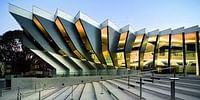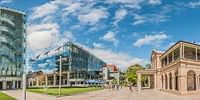- In the first two years, students will study the fundamentals of engineering and the basics of biology, anatomy, and physiology. As progress into the third and fourth years, students will become industry-ready through major design projects that mirror the work of practicing biomedical engineers.
- Through a combination of classroom training and industry placements, an individual will receive an industry-focused education in the fundamentals of biomedical engineering.
- Students will have the opportunity to design creative solutions through inspiring and sustainable design-and-build projects, as well as taking part in the Engineers Without Borders Challenge - a humanitarian-focused course offered in all engineering degrees.
- This program will: develop the knowledge and skills essential for a professional career in biomedical engineering, prepare for employment in the medical, biomedical, biomechanical, medical equipment, medical laboratory, bioinformatics, and other biomedical and health-related industries.
Bachelor of Engineering [B.Eng] (Biomedical Engineering)
4 years
Honours & On Campus
English
Field of Study:
A$42,240/Yr
A$42,240 /Yr
Important Dates
| Event | End Date |
| Application Deadline For Semester 1 Intake | Mar 1, 2023 |
| Acceptance For Semester 1 | Mar 8, 2023 |
Fees & Funding
Tution & Application Fees
| Year | Year 1 | Year 2 | Year 3 | Year 4 |
| Tuition Fees | A$42240 | A$42240 | A$42240 | A$42240 |
| Total Fees | A$42240 | A$42240 | A$42240 | A$42240 |
Eligibility & Entry Requirement
Academic Eligibility:
Following are the requirements for this program:
- Students must have successfully completed an Australian Year 12 (or equivalent senior secondary school) qualification.
- Victorian Certificate of Education (VCE) Units 3 and 4: a study score of at least 30 in English (EAL) or at least 25 in English other than EAL.
Indian Student Eligibility:
Indian students are eligible to apply if they meet one of the following eligibility criteria:
- Students must have successfully completed an Intermediate 12 (or equivalent senior secondary school qualification) with a minimum 65% average.
Along with the minimum eligibility requirements, international students hailing from non-English speaking countries need to prove English proficiency through IELTS/TOEFL/any equivalent test to get admission to this program.
Ask your question
Similar Colleges You Might Be Interested In
- Similar Colleges
No Ratings Found!!
Follow
No Ratings Found!!
Follow

Australian National university test1
Canberra, Australian Capital TerritoryNo Ratings Found!!
Follow








